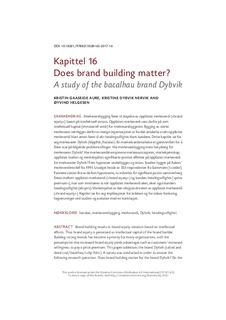Does brand building matter? A study of the bacalhau brand Dybvik
Chapter, Peer reviewed
Published version

View/
Date
2017Metadata
Show full item recordCollections
- Articles (IRRR) [45]
- Publikasjoner fra CRIStin (NHH) [249]
Original version
Immateriell kapital. Fjordantologien 2017, kapittel 16 10.18261/9788215028163-2017-16Abstract
Brand building results in brand equity creation based on intellectual efforts. Thus brand equity is perceived as intellectual capital of the brand builder. Building strong brands has become a priority for many organizations, with the presumption that increased brand equity yields advantages such as customers’ increased willingness to pay a price premium. This paper addresses the brand Dybvik (salted and dried cod/bacalhau/«clip-fish»). A survey was conducted in order to answer the following research questions: Does brand building matter for the brand Dybvik? Do the brand equity dimensions brand associations, brand awareness, perceived quality and brand loyalty have significant positive effects on the brand equity for the brand Dybvik? Five hypotheses are underpinned and tested. The study builds on Aaker’s (1991) brand equity model. The sample comprises 333 respondents from Sunnmøre (ten locations). Four of the five hypotheses are supported, two partly (indirectly). A significant positive relationship is found between brand equity and price premium. Brand loyalty is the most influential driver of brand equity. The paper addresses managerial implications, limitations and implications for further research, and finally offers a conclusion.
